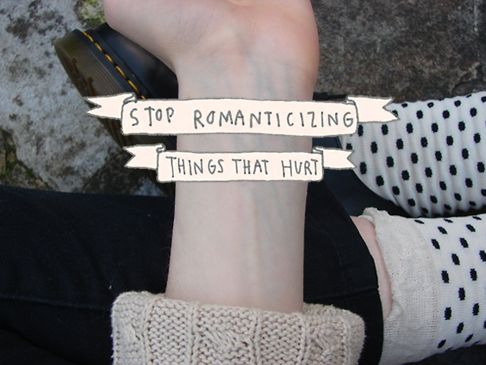The Ugly Truth About Pain

These days it doesn’t take much time on the Internet before I find a post that makes me roll my eyes, but I’ve noticed a pattern lately of certain images and ideas on the blogging website Tumblr that make me sick to my stomach with rage.
Every now and then, I’ll come across an image of a person self-harming, or someone who has self harmed. And the picture will have some pretty, innocent quote around it. Or the scars will be surrounded by dainty and sweet decorations like flowers or hearts.
What the worst part is, is that the image will be responded to with someone saying how beautiful these images are.
A select group of young females are trying to romanticize self-injury, turning an extremely addictive and destructive behavior into poetic justice.
The most ironic part about it is that the images are sometimes reposted by girls who have never partaken in any self-injurious behavior, but find it beautiful and admirable.
As someone who struggled with self-harm for several years, I was stunned by what I saw, and in many ways I was extremely offended.
It is very strange, the thoughts our minds never forget and the thoughts they struggle to remember.
I can’t recall what I had for dinner last night, but I can’t forget the panic I felt the first time someone saw my arms after a night of self-harm.
I remember it was in seventh grade.
I remember being in my environmental science class.
I remember the shock and confusion in her eyes.
I remember my heart and mind racing as I desperately tried to come up with a million excuses for the markings within a single nanosecond.
But mostly, I remember being absolutely ashamed of myself.
Let me just say that self-harm is not an action that is beautiful, or romantic, or glamorous in any way shape or form.
It is not cute or pretty or inspirational.
It is a horrible coping method that can destroy the lives of many people. And it almost ruined mine.
Self-injurious behaviors are symptoms of several mental illnesses including, but not limited to: borderline personality disorder, anxiety disorders, depression, anorexia nervosa, bulimia nervosa, oppositional defiant disorder, and conduct disorder.
Now, you’re probably thinking the same question I’ve been asked thousands of times throughout my years of suffering to my years of recovery: why would anyone do that?
To tell you the truth, it’s different for everybody. For example, some people do it as a means of control, some people do it for the rush, and some people do it because they think they deserve it.
But no matter what a person’s reason is, the results are always the same.
Addiction.
Pain.
Shame.
Emptiness.
According to Mental Health America, an estimated two million people in the country engage in self-injury every year.
And I can guarantee that out of those two million, not one of them thinks their acts are beautiful or something other people should be dazzled by.
Do you know what can happen to someone who self-harms or is in recovery when they see a picture of an injured arm on the internet? Relapse.
When in recovery for self-injury, you learn about triggers – emotions that set off the feeling of needing to self-harm.
They can come in many different forms. For example, talking about it in conversation, dealing with a difficult situation that your past self would cope with by self-injuring, or seeing an image or video that sets you off.
In this case, when you see someone glorifying a behavior that you’re trying to convince yourself is bad for you, it makes you crave it more.
Having an addiction to self-injury is the same as having an addiction to drugs or alcohol.
It numbs your bad feelings, it gives you temporarily relief, it makes the world go away for a little bit, and it is extremely difficult to quit.
When you’re in a situation that makes you want to self-harm, it’s all you can think about.
Your mind is a chaotic jumble. When can I get away and do it next? What can I use to make this happen? How many times do I have to do this before I feel better? I can’t breathe without it. It’s the only feeling to make this all stop.
I need it, I need it, I need it.
For anyone who has ever suffered a drug or alcohol addiction, these all sound pretty familiar, don’t they?
As someone who has been stigmatized for most of my life for mental illness and engaging in self-harm, you would think that I would be appreciative of strangers on the internet trying to make my past struggles seem beautiful.
But the truth is, there is nothing beautiful about feeling so alone and out of control that the only sensation that could give me a moment of peace of mind was to hurt myself.
There is nothing glamorous about blood stained sleeves that will never wash away.
There is nothing spectacular about having to wear long sleeves and pants in the summer time because you’re too afraid someone will see the scars, fresh wounds, or bruises.
There is nothing cute about being lost, alone, and afraid.
Every day I examine my body, and my eyes are immediately drawn to thin white lines that write a story of suffering, pain, and loss on my skin. And every day I wish I could replace them with blank pages.
But I can’t.
I will be reminded every day of the horrible emptiness and chaos that nearly took my life away because I am permanently marked by my sadness.
Society has a tendency to romanticize self-destructive behavior, but I don’t want to be considered beautiful because I have scars.
I want to be considered beautiful, admirable, and glamorous because I am strong.
Because I was able to overcome an addiction that almost killed me.
So next time you see an image on the internet of someone with fresh wounds or scars, don’t feel the need to repost them or comment on how lovely they are.
Delete the image, report the image, and do whatever you can to get rid of it.
Don’t be the trigger that makes someone suffering decide to hurt themselves that night.
Don’t be the person that makes someone think their addiction is okay.
And most importantly, don’t give the credit a survivor earned to their injuries.
It isn’t our scars that you should want to romanticize, but our strength to move forward.

Jaclyn Miranda is a senior with a psychology major and a love for writing. She is a volunteer for The Impact newspaper with the hopes of successfully building...







